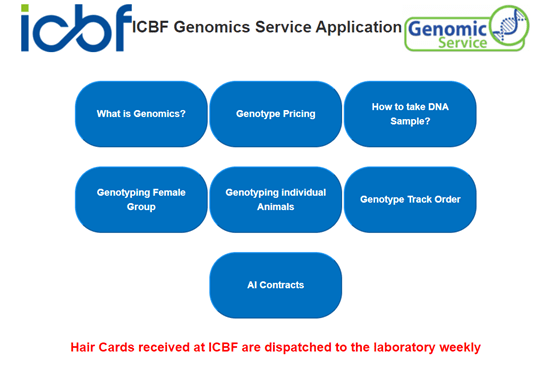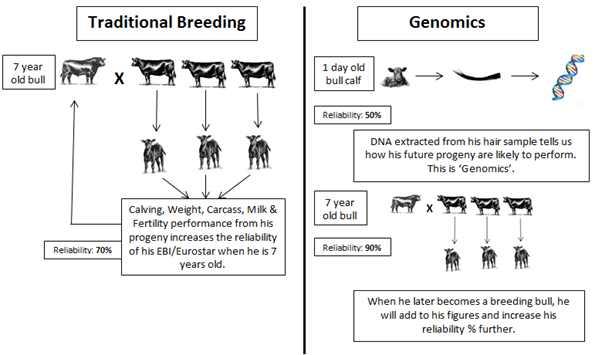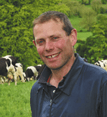The level of genotyping in Irish dairy herds has been significantly increasing over the last 10 years and continues to revolutionise the global dairy industry. 2019, 2020, and 2021 have seen the greatest surge, with almost 98,000 dairy females having been genotyped in that time period. The addition of multi-dairy breed genomics in 2020 has also had a positive impact on the total number of dairy females genotyped to date. January to August 2021 has seen an increase of 27% in dairy female genotyping compared to the full year 2020, which is very promising.
 Figure 1: The number of diary females genotyped from 2011 to August 2021.
Figure 1: The number of diary females genotyped from 2011 to August 2021.
What exactly is genomics?
Genomics is the study of an animal’s DNA or ‘Genotype’ (usually a tissue or hair sample). DNA is transmitted in chunks and genomic testing then identifies which DNA chunks have been passed from the parents to their offspring.
The genotype is studied to check parentage to confirm that the dam and sire recorded are correct. The second thing that genomics then looks at is an animal’s traits (milk production, carcass weight etc.), the genomic sample is essentially compared to the genomic samples of proven animals. Animals that are superior on certain traits will be identified through their genotype sample before any performance data has been recorded. When an animal is genotyped all these traits are studied, genomics is then added to the phenotypic data (traditional data) and an index with more reliability is then formed as a result. Genomics includes the DNA of an animal in addition to other performance data on relatives, in its EBI/Eurostar calculation.
With Traditional Breeding – for an animal’s figures to become more accurate, you must wait until it expresses its genes through its progeny. With Genomics – an animal’s genes are analysed and more accurate figures can be calculated at birth.
Why should I genotype my dairy females?
Many dairy farmers in Ireland have made genotyping their heifers standard farm practice and consider it an essential aspect of running their business. The genomic information combined with ancestry information provides an increase in the EBI reliability from a much younger age. The increase in EBI reliability is key when identifying the most profitable heifers to keep as replacements, giving farmers confidence when decision making. The reduced rate of €22/head is a great incentive for farmers toying with the idea of introducing genotyping in their herd.
Genomic selection has been successfully applied to males since 2009. It has allowed farmers to achieve a higher rate of genetic gain in their herd through using genomically selected bulls. Genotyping dairy females can take this progress even further and it comes with many benefits:
Replacements: Identify the best heifers to breed as replacements.
Genomic Evaluation: Animal has genomics included in its EBI which is a better prediction of the true value of an animal’s genetics.
Parentage Verification: Confirms parentage (assuming parents are genotyped)
Genomic Selection: Improves the reliability of genomic selection by increasing the number of animals in the reference population.
Testimonials:
“Genomic selection has allowed me to identify my best heifers to breed as replacements and maximise farm profitability” – Richard Starrett, Co. Donegal

“We have genotyped all our dairy females each year since 2011. We are delighted with the service. It has confirmed the parentage and helped immensely with our breeding decisions.” – Tom & Kathy Kearney, Co. Cork
What dairy breeds are eligible for genotyping?
Holstein/Friesians, Jerseys, Ayrshires, Montbeliardes and Norwegian Reds are now eligible for genomic evaluations.
How can I genotype?
To avail of this service, you can order through our self-selection screen by logging into your HerdPlus account and selecting ‘Services’ – ‘Genomic Services’ – ‘Genotyping Individual Animals’ or ‘Genotyping Female Group’. The cost is €22 per animal. Herds involved in the Dairy Gene Ireland programme may have access to an additional discount.

What happens with the results?
The genomic results will be incorporated into the animal’s genetic evaluation and can be viewed quickly and easily on the dairy genomic results evaluation profile. A detailed genomic evaluation report will also be available to view on the reports section of the website. This genomic information can be used to make better management decisions such as mating optimisation, verification of parentage, and increase the EBI reliability figure.
For more information on genotyping your dairy females please contact the HerdPlus office on 023-8820452 or email [email protected].


